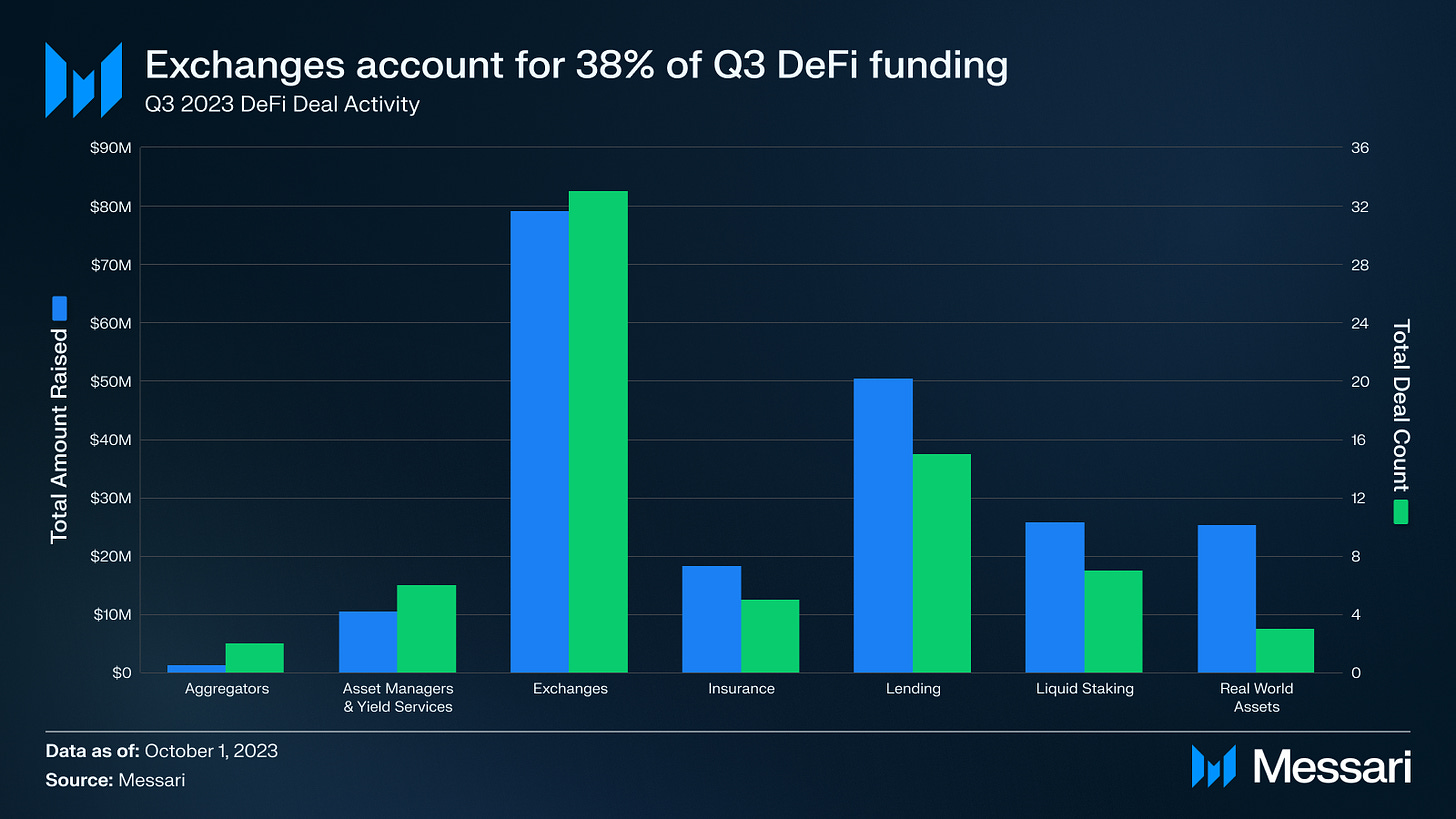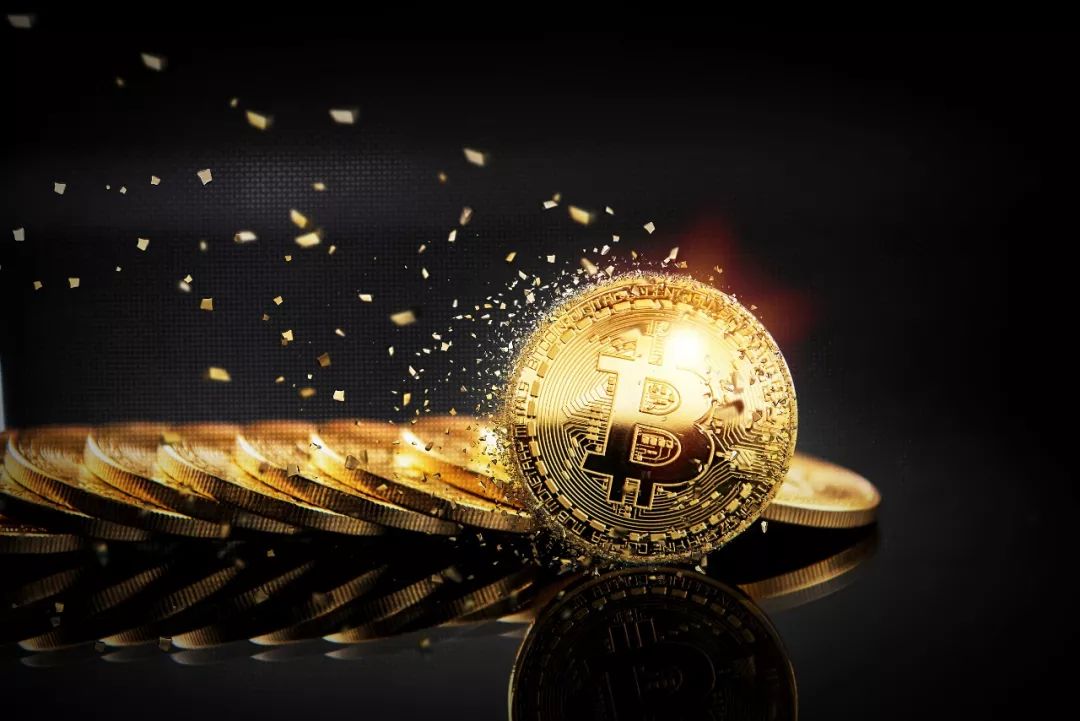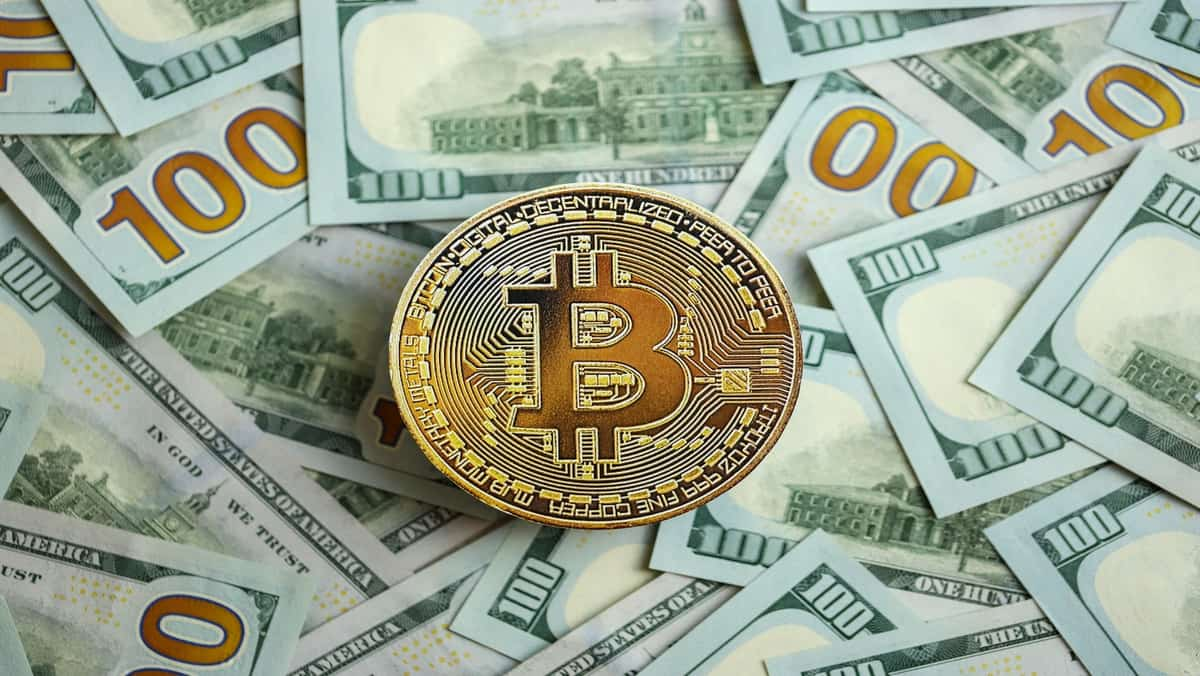Take a look at the chart below.
The correlation between BTC price and fundraising amount in the crypto market is truly fascinating. As the price of Bitcoin dropped, the fundraising amounts also decreased.
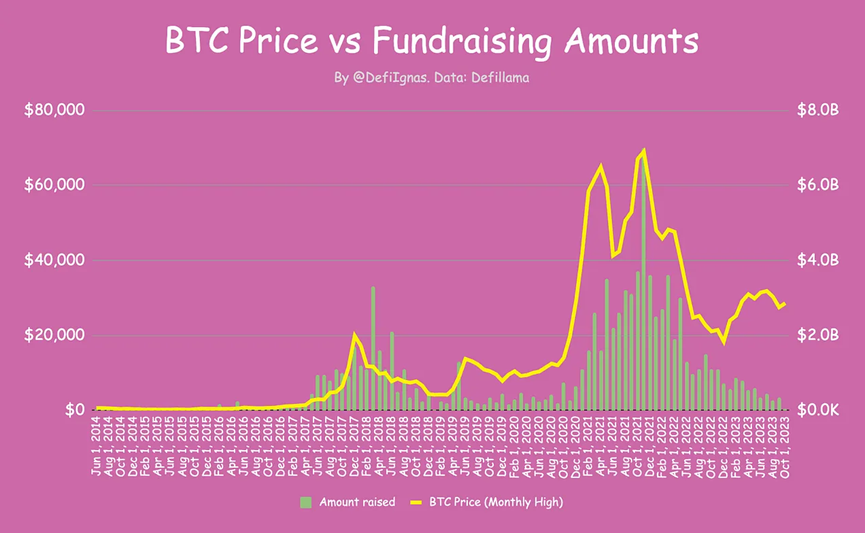
Interestingly, despite BTC and ETH prices being higher than during the peak of the 2018 bull market, fundraising has returned to pre-2020 level. BTC has actually recovered from 2022 lows yet fundraising amounts have been continuously grinding down.
It got me thinking.
Venture capitalists are often perceived as market leaders, making informed and forward-thinking decisions. Why then does it seem that VCs are following the general market trend rather than setting it?
And while the market has slightly recovered, the fundraising amounts are down to 2018-19 levels. Do they know something that we, mortal retail, don’t know? Shouldn’t they ‘buy the dip’ and invest right now, when valuations are low? Especially since lock ups prevent VCs for selling right away and some might end up selling into the following bear market to come.
To found out, I reached out to several crypto VCs and DeFi project founders who recently secured funding. I'm pleased to share that Sachi Kamiya from Polygon Ventures, Etiënne from TRGC, along with an anonymous angel investor (from now on Mr. Anon), agreed to provide their perspectives.
Jaimin, founder of Caddi, also offered valuable insights from the perspective of a DeFi builder. Caddi is a browser extension to save money in DeFi swaps and protect you from scams. He recently raised $650K in funding from VCs including Outlier Ventures, OrangeDAO, and Psalion VC, as well as angel investors Bryan Pellegrino from Layer Zero, Alex Svanevik from Nansen, and Pentoshi.
Before we do, have you ever considered creating your own stablecoin? If yes, check out Reserve Protocol.
Currently, there are 5 countries worldwide with an inflation rate higher than 100%, and 23 countries exceeding 20%. The cost of sending a $200 international remittance can be as high as $8 to $34 depending on the send/receive corridor.
Getting credit may depend on the gray markets and sometimes results in unfair loans, data theft, harassment and physical harm. It’s clear that the need for safe, stable money has never been more important.
Stable currency should be a human right.
With Reserve Protocol, anyone can create their own decentralized stablecoin, flatcoin or tokenized index RToken utilizing the Reserve Protocol with fast speeds and near-zero gas fees on Base L2. The protocol already has $30 million in TVL and facilitated $341 million in transactional volume since the first RToken launched in Feb 2023.
How bad is the situation?
The below chart by CoinCarp provides a different perspective. With $18.6B and 1053 deals in total, the fundraising situation looks much better than in 2020.
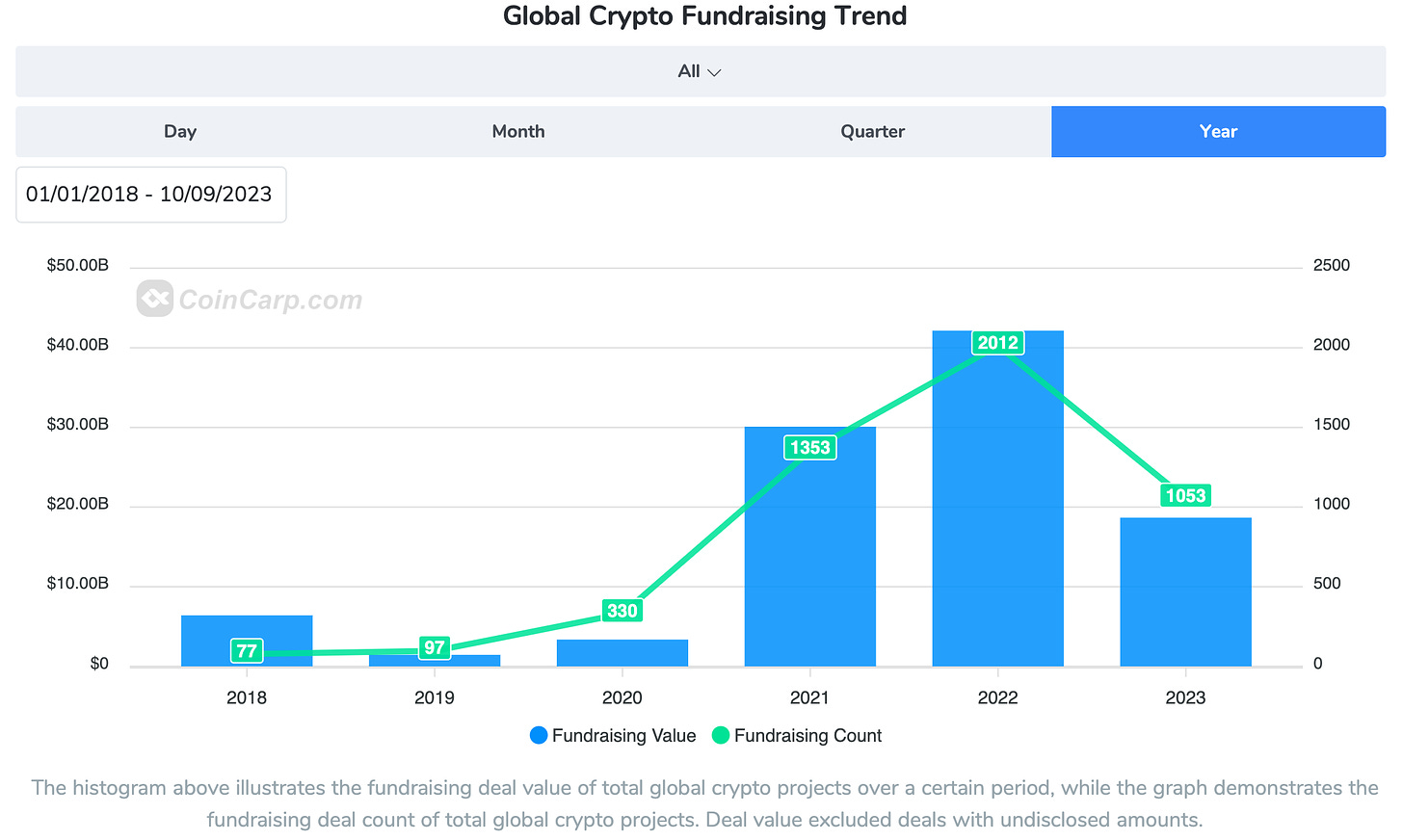
Yet, this chart includes Web2 deals such as $6.5B Series I raise for Stripe that’s not really relevant to our retail pockets.

(Credit to @CharlieXYZ_ for chart)
When it comes to my beloved DeFi, there were 175 DeFi rounds raising a total of $779M, with an average of $4.45M per raise. This is a big decrease compared to last year when 341 raises totaled $3.56B, averaging $10M per round.
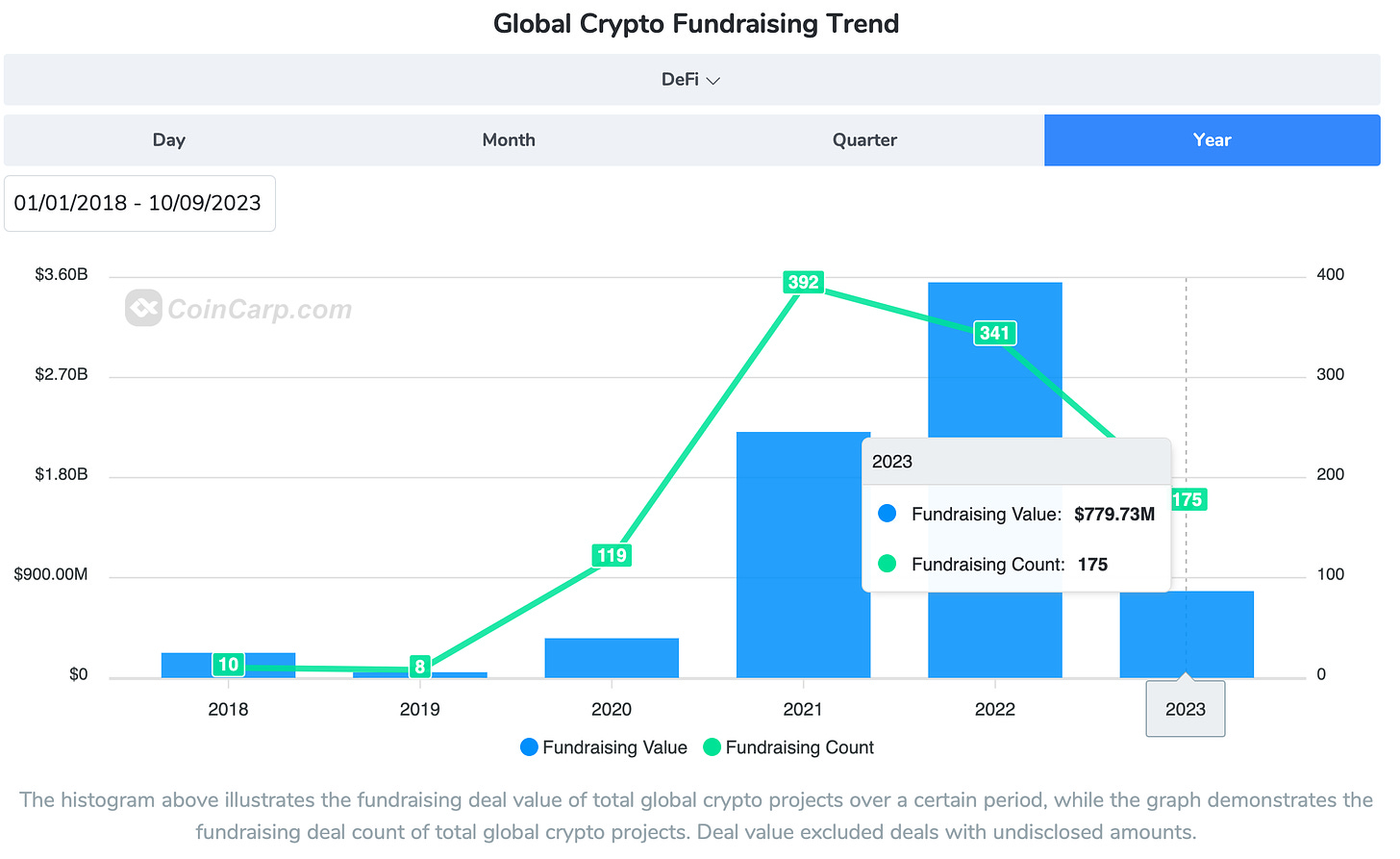
So, the money is tighter and the average sum raised per round has decreased by over 55%.
Unfortunately, DeFi sector is actually the second worst performer, just above NFTs. Over the past 365 days, DeFi protocols have only managed to raise $1.14B, while CeFi startups raised $2B. Where’s our decentralized future? 😅
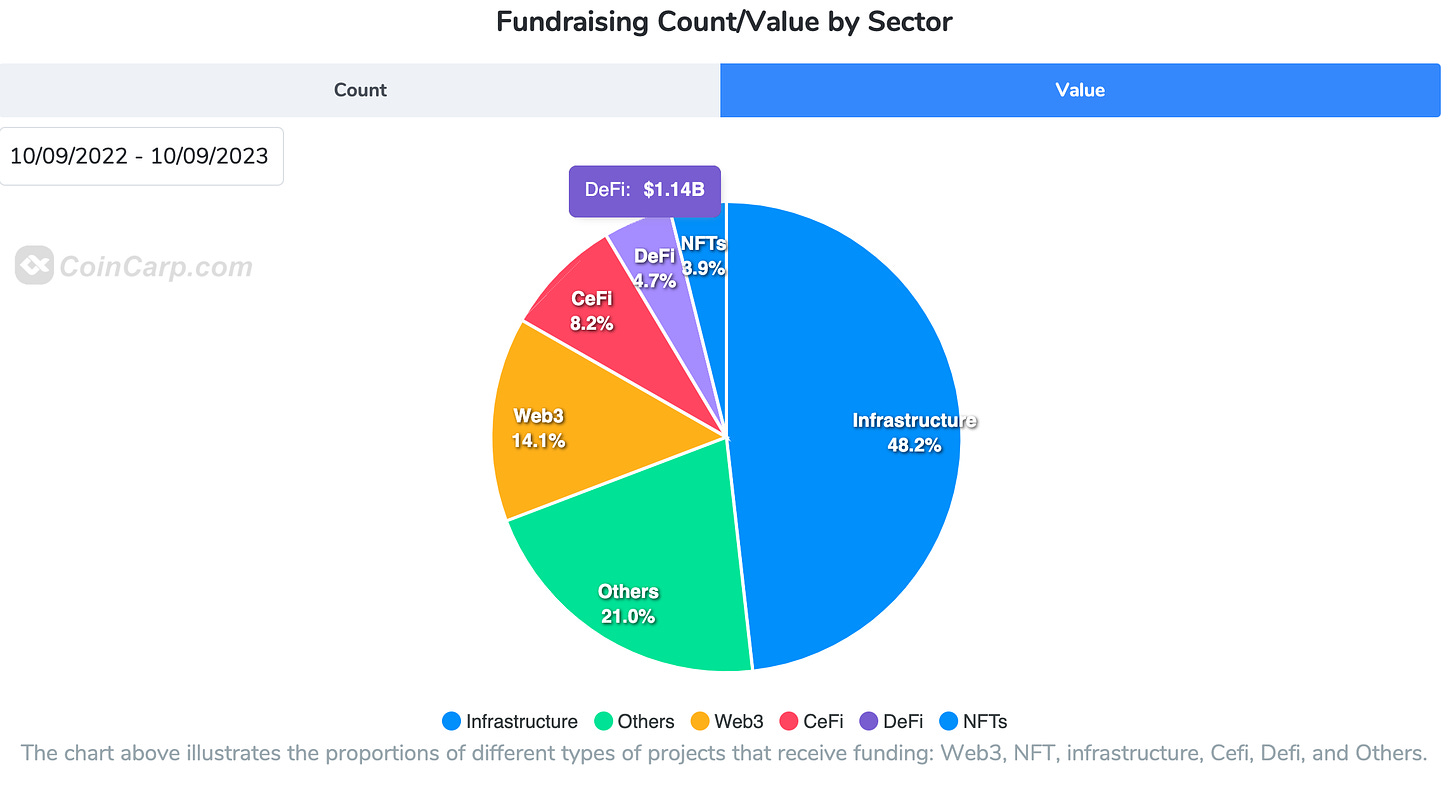
Looking closer, exchanges are dominating in DeFi for fundraising. They accounted for 38% of all funding in Q3 2023.
Overall, due to tight money multiple crypto companies are laying off people, with major layoffs at Yuga Labs, Ledger and Chainalysis announced last week.
Despite the bear market, there are still a few notable protocols that have successfully raised significant funds. This gives hope that investors have not completely abandoned crypto and DeFi. In fact, Blockchain Capital has recently raised $580M to invest into DeFi, gaming, and infra projects. So I hope this blog posts markets the bottom for fundraising amounts.
When asked about the current fundraising market from the perspective of a DeFi builder, Jaimin commented that "the markets are as bad as they have been in the last few years, mostly in line with macro conditions." Sachi from Polygon Ventures shares a similar sentiment, stating that:
The general sentiment in crypto VC is bearish. Fewer early-stage projects are raising capital due to the negative sentiment.
Mr. Anon angel investor put it in numbers, saying he has “maybe 10% of the deal flow that I saw on the bull market.”
Comparing it to the past bear market, Etiënne noticed that “what's different from 2019 is that there is genuine money parked on the sidelines. In 2019? There was ZERO.”
That’s why the market still offers great opportunities. Mr. Anon, Etiënne and Sachi all agreed that it's a great time to find deals without crazy valuations, and Sachi points out that investors "can take their time to do due diligence on each project, but VCs are focused on user metrics and real adoption."
Interestingly, this is exactly the hardest thing to do for early-stage projects. Jaimin said that "investors want to see exponential growth, whether that's revenue, users, TVL, or trading volumes in our case.
'Sustainable' growth in this market is very hard with few new people flowing in, low volatility, depressed prices, and general bad sentiment. Selling just a vision is usually not enough." - Jaimin
Sachi concludes optimistically that “it makes sense to invest now as some of these projects will do well during the next cycle.”
Why do we need crypto VCs?
There’s a lot of mistrust, animosity, and negative sentiment towards crypto VCs in crypto. The main reason is obvious; dumping on retail investors.
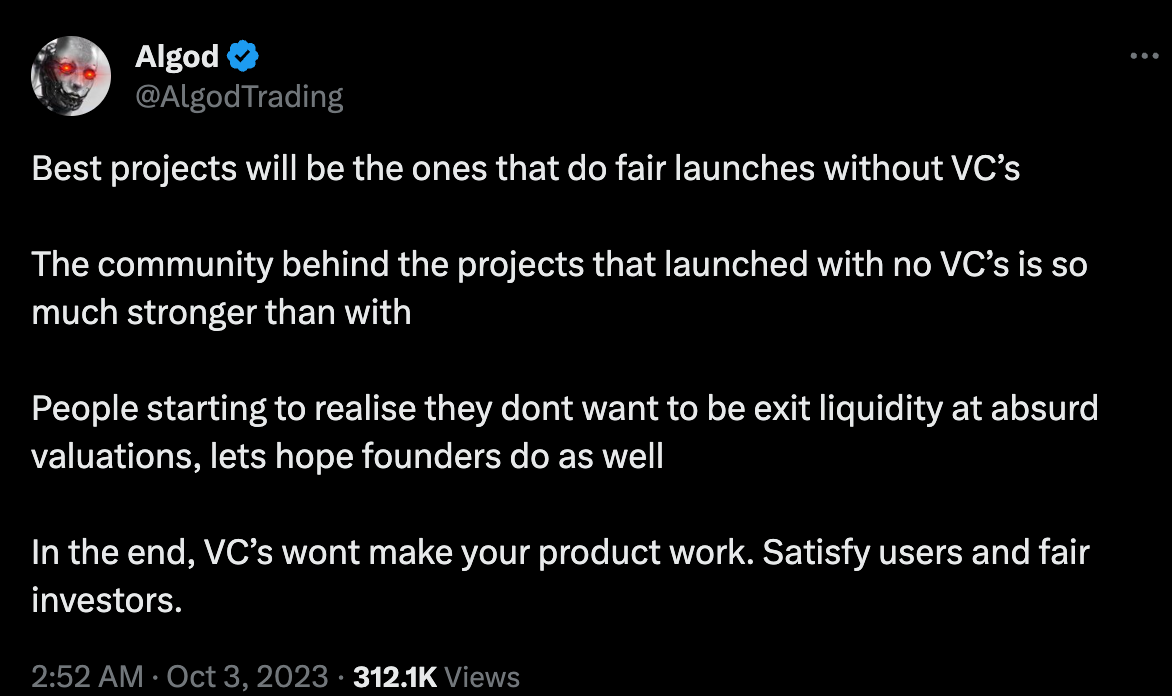
Algod tweeted that the best projects will be the ones that do fair launches without VCs as people realize they don’t want to be exit liquidity. In another post, he has also shared that VC funding will be a bearish catalyst compared to 2021 as “prioritising community will be key, projects starting to realise volume is not drive by VC’s but by the average joe.”
And this view is shared by some non-crypto investors as well.
For example, in an interview with Bloomberg, Jason Calacanis—an angel investor in Robinhood, Uber, Superhuman—has warned crypto ‘grifting’ VCs of potential repercussions of flipping crypto tokens to retail.
Calacanis believes that many of these tokens are securities being offloaded onto unsuspecting retail investors by venture firms. He predicts significant litigation and possibly criminal charges for companies and VC firms that knowingly sold ‘worthless’ tokens.
So… Can we skip crypto VCs altogether? The biggest concern is how “fair” the “fair launches” are.
According to Mr. Anon, “fair launches are not so fair because teams and insiders know about them prior to the actual launch and can snipe liquidity.” Jaimin shares this skepticism, stating that he doubts whether launches these days are truly "fair" due to various ways people can manipulate them, and “dumping on one another will always be there.”
Etiënne from TRGC agrees: "Fair launch or not, the incentive to make money is still the same. Retail is not innocent. Retail traders are market gamblers with less money.”
Having said so, fair launches could work “for projects with founders who already have experience running a crypto company”, Sachi said. All interviewees seem to agree that for first-time founders and those without initial resources the fair launch is a tough game, especially if the project is “not a fork or a low-hanging fruit,” as mentioned by Mr. Anon.
Personally, I like the story of a fair launch. The birth of YFI and INV by Inverse Finance are still my favorite memories from 2020 DeFi summer. I hope we’ll see truly fair launches in the bull run to come.
But I’d dare to say that VCs play an important role crypto with initial capital injection, mentorship, offering networking opportunities, and even giving a credibility boost to the projects industry as a whole.
What can we learn from crypto VCs?
That's the main question that motivated me to write this blog post.
It’s a bit disappointing to see fundraising amounts to be following general BTC price trend rather than set them, as shown by the BTC vs Fundraising amounts chart. One would expect savvy VCs to be able to anticipate market movements and increase fundraising amounts at the end of a bear market, enabling them to cash out during the bull run.
Sachi provided valuable insight:
Not all VCs follow market trends. Some VCs, in particular US-based ones, tend to invest based on market trends. But this is not the case for many Asian VCs– in fact, they became more active during the bear cycle because there are good opportunities.
Mr. Anon angel investor added that projects raise during bear runs, but they “will make announcements when it makes more sense for them.”
Then there’s also token lock ups for VC, complicating cashing out strategy. My believe is that investing during bear runs would allow VCs to sell tokens on the upswing when lock ups expire. On the flip side, if VCs invest during the bull runs, they might need to sell during a bear run, further suppressing already depressing altcoin prices.
The timing seems tricky. Mr. Anon shared that:
There’s some uncertainty around TGE [token generation event] because usually that’s the time when unlock timers become active. I think that at least big products just wait until the best time for the launch and with good lock structure it’s still possible make money just after the end of cliff.
Polygon Ventures, Sachi told me, takes unlocks in consideration with the quality of the project, preferring shorter unlocks. But they take into account how crypto-native the team is.
It takes skill to manage a token ( eg: listing on exchanges, market makers, etc ). The more crypto-native the team is, the more likely the project will succeed long-term.
So, what lessons can we learn form VCs?
Etienne is pretty blunt:
LOL, uhm nothing.
Matter of fact, stop listening to VCs. I have like 95% of VCs on mute on all platforms. I'd strongly recommend old foxes like Howard Marks, Nassim Taleb, Warren Buffett, Stan Druckenmiller, Ed Thorp, Jim Simons, Mark Spitznagel etc.
One exception on this. I would only listen to VCs with a 30 year trackrecord like Mike Moritz or Doug Leone. Not the "I got lucky with token XYZ, now let me teach about investing", these guys are the worst. Nothing to learn from them.
Mr. Anon advice is simple. Don’t put all eggs into one basket. “Even some VCs made this mistake and lost a lot.” And as crypto users, “we should be trying to educate people about the projects, share feedback and suggestions, etc. It’s very valuable from power users.”
Sachi gives practical advice. “Asking the right questions and doing your research is important. E.g: are these REAL user metrics? Are the founders legitimate?”
Retail investors should understand that, whenever an announcement is made by a project (e.g: a partnership with a big company or project), there is more than meets the eye. There are many moving parts involved in closing a deal and incentives that may not be part of the announcement ( eg: token swaps, grants, incentives, etc ). Retail should always think about whether a protocol’s traction is organic or not and invest accordingly. - Sachi Kamia, Polygon Ventures
Jaimin has also emphasised risk management, but his final advice is very relevant to me as well.
I would also advise people to skill up, read and never stop learning, DeFi moves incredibly fast and becoming knowledgeable about areas you're interested in can pay dividends: you can reason and add value to projects at large!
Interestingly, while I was writing this blog post Sachi just tweeted this 👇

NFA, but seems that we, retail, can do well in crypto. Like retail, VCs also get FOMO and invest on what’s hot. My advice is to do your research and front-run the narrative, not follow it. If you want to know my approach, here’s a thread below.
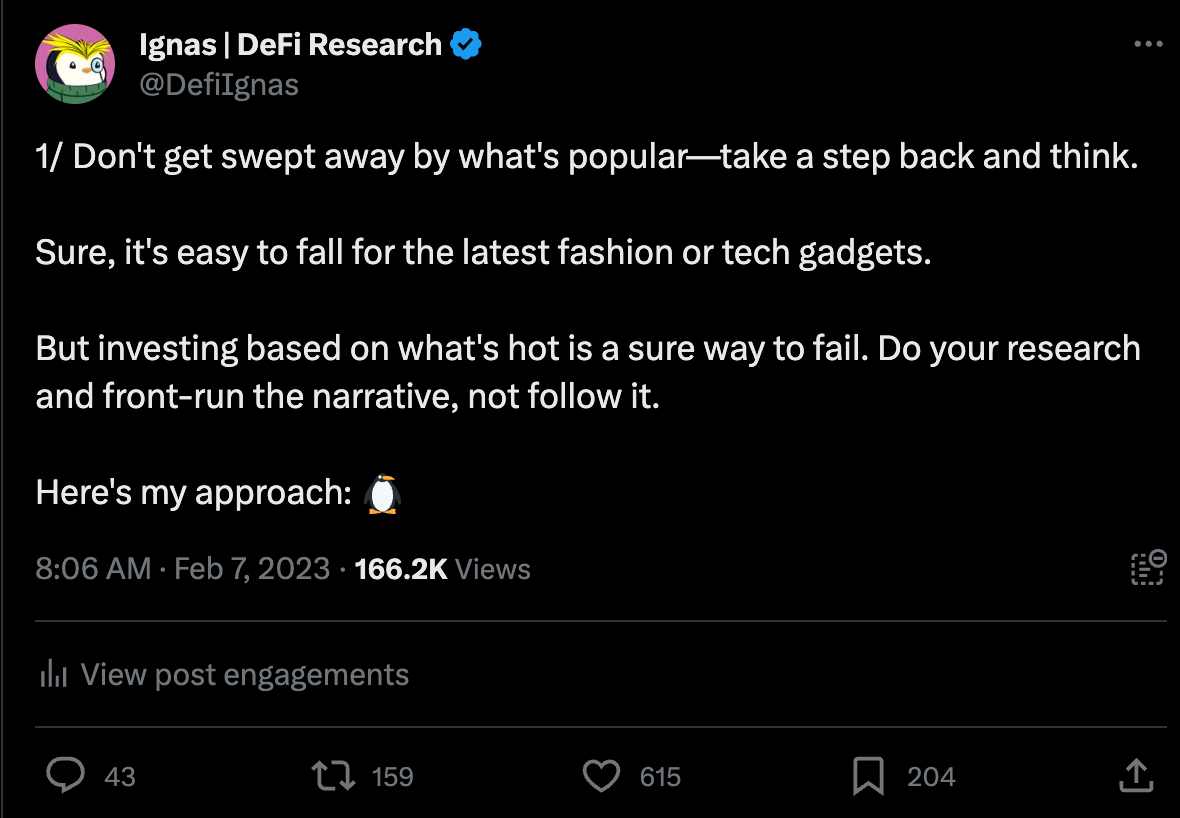
Oh, and pls click on the ❤ if you liked this post! And if you can, please share this post to your friends… so I can charge more for my blog sponsorship and retire early!

